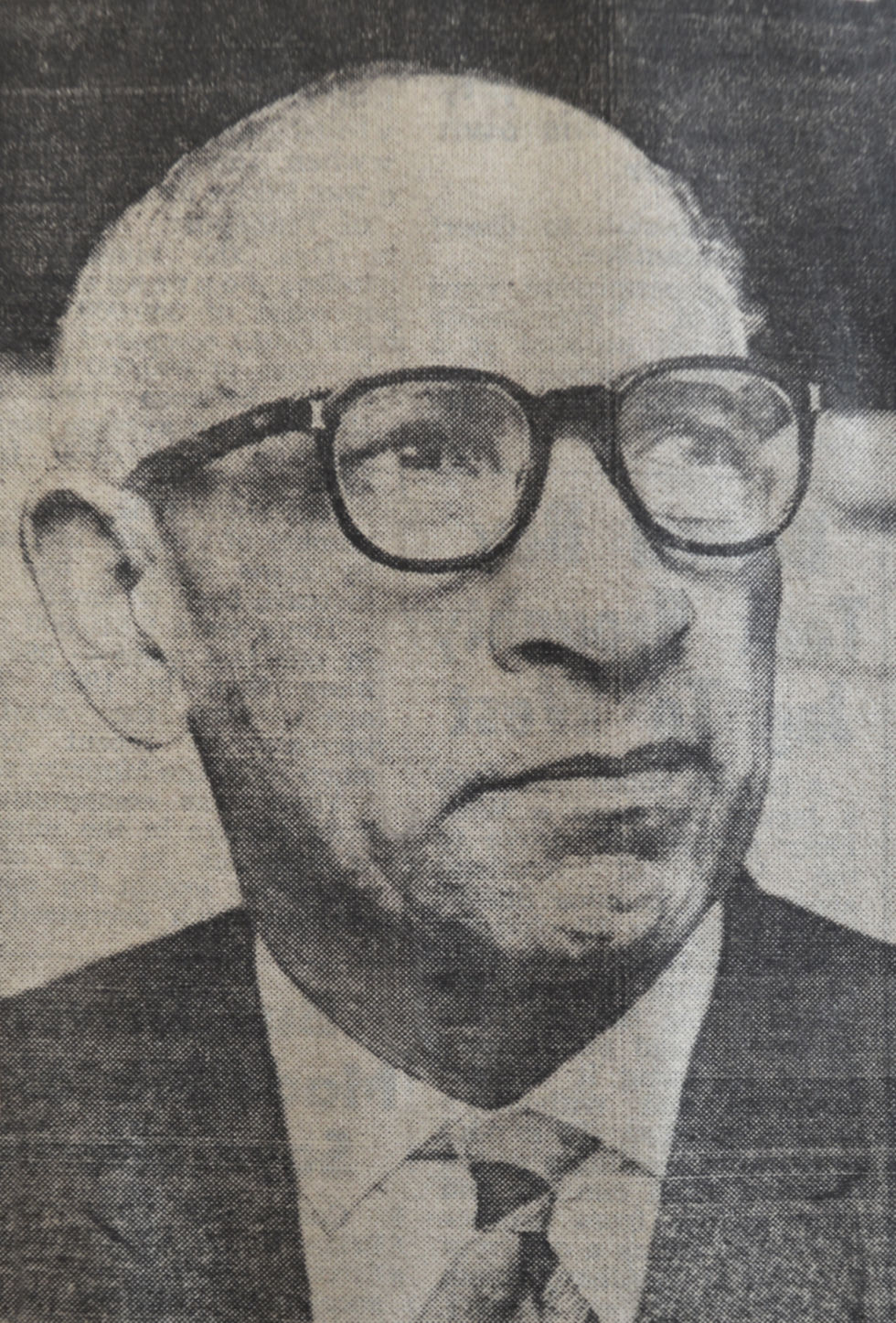Walter Kamba
- woventogetherdundee

- Dec 8, 2021
- 5 min read
Updated: Jul 29, 2023

Dundee should consider it an honour that for over a decade it was home to Walter Kamba. While he is best remembered in his adopted city as a great teacher, he has an international reputation for the important roles he played in African academic and constitutional affairs. Yet his time in Dundee undoubtedly influenced his later career. Goolam Mohamedbhai, the former Secretary-General of the Association of African Universities, a would later state “It was no doubt at the University of Dundee that... [Walter Kamba] developed an appreciation of institutional autonomy and academic freedom in universities, values which guided him throughout the rest of his academic career”
Walter Joseph Kamba was born in what was then Southern Rhodesia, at that time still a British Crown Colony, on 6 September 1931. He went on to attend the University of Capetown where he was awarded a Bachelor of Arts Degree followed by a law degree. He would later earn a masters from Yale Law School during a period as a Fulbright Scholar in the United States.
In 1960 he married his wife Angeline (1935 -2017) who in 1957 had become only the second woman of African heritage in Southern Rhodesia to receive a university degree (which she was awarded by the University of South Africa). She later obtained a Masters degree in Library Science from Columbia University.
At the time of his marriage Walter was active in the legal profession in Rhodesia, serving as and he gained prominence when he served as part of the Southern Rhodesian delegation to the 1960 Federation of Southern Rhodesia and Nyasaland Constitutional Review in London. However the political situation in his homeland quickly deteriorated. In 1962 the far-right Rhodesian Front won the Southern Rhodesian general election. This was followed by the coming to power in 1964 of Ian Smith whose government issued an illegal unilateral declaration of independence of the UK to ensure the imposition of minority white rule in Southern Rhodesia. These developments effectively forced him into exile.
In 1969 Walter joined the Law faculty at the University of Dundee as a lecturer to teaching jurisprudence and comparative law. He was one of many talented staff recruited around this period by the then Professor of Jurisprudence, the late I D Willock. A talented and popular academic, Walter was promoted to Senior Lecturer in jurisprudence, becoming Dean of the Faculty of Law in 1977. This made him the first person from a non-white background to hold a senior academic role at the University. He also served as an advisor of studies and was elected by his colleagues as the first convener of the Standing Committee of the Academic Council.
He was a popular teacher beloved by colleagues and students. He was noted for his warmth and rapport with this he came into contact with and by all accounts proved to be a talented footballer when he took part in staff-student matches. Angeline had also joined Walter at the University, working for the library service where she helped build up the law library. It was during this period that the Law School moved from Bonar House in Bell Street to the old Dundee Training College Building in Park Place. This was renamed the Scrymgeour Building in honour of the celebrated 16th century Dundee-born lawyer and legal-scholar Henry Scrymgeour. Walter oversaw the official re-opening of the building in 1979 by the Earl of Dundee, the head of the Scrymgeour family. The same year he also delivered the laureation address at the awarding of an honorary degree to James Drever, the first Principal of the University of Dundee.
He had however kept close interest in the affairs of his homeland and in 1979 was a key legal advisor to Robert Mugabe and other leaders of the Patriotic Front at the Lancaster House talks. These led to the creation of the modern Zimbabwe as a republic with black-majority rule and allowed the reintegration of the country into the international community. This was an outcome many observers had thought impossible, and Kamba should be seen as a key figure in the creation of the new state. It was inevitable that this would lead him to leave Dundee and return to Zimbabwe to take up a senior role, so it was no surprise that in 1980 he moved to become the first head of the newly reconstituted University of Zimbabwe. Angeline meanwhile became director of the National Archives of Zimbabwe. This was not the end of the Dundee association however as in 1982 Walter was awarded an honorary degree by the University of Dundee in recognition of his many achievements.
During his time at University of Zimbabwe he oversaw a massive expansion and reorganisation of the institution which saw its student population increase by over 700%. Taking an interest in educational developments elsewhere was seen as a key figure in the expansion of University education in former colonies in Africa and for improving black Africans access to higher education. He also held important positions on international University bodies including being the first president of the International Association of Universities from an African University.
However Walter Kamba became concerned by the direction his country was taking, He was particularly what he saw as political meddling by the Mugabe Government in University affairs, which he feared would be catastrophic for academic standards and freedom. This led him to resigned as Vice-Chancellor of the University of Zimbabwe following a speech at a 1991 graduation ceremony where he publicly voiced his opposition to government interference. This was a brave stance to take especially as Mugabe, the Chancellor of the University, was among the audience. While he had undoubtedly alienated himself from his government, Walter Kamba continued to enjoy respect from many in Zimbabwe and beyond. He served as an international observer to the first post-apartheid elections in South Africa in 1994. He also held a professorship at the University of Manitoba and became the first dean of the Faculty of Law at the University of Namibia.
After a long struggle with diabetes Walter died in May 2007 at the age of 76. Angeline Kamba died just over a decade later in 2017 after a prolific career which included serving on the UNESCO World Commission on Culture and Development and chairing the Harare International Festival of the Arts among many highlights. Both are recognised as figures who not only greatly contributed to the development of their own country, but who made a mark on an international scale. We can be proud that part of their remarkable careers took place in our city.
Written by Kenneth Baxter, University of Dundee Archives
Find out more at:
Sources:
University of Dundee Archive Services (UR-SF 1 Staff Biographies; RU 354 Contact - Various issues)
Michael Shafe, University Education in Dundee: A Pictorial History (Dundee: University of Dundee, 1982)
The Times (various issues)
Goolam Mohamedbhai, "IAU President Walter Kamba (1990–1995): A Man of Conscience" at https://link.springer.com/chapter/10.1007/978-3-030-67245-4_7
Personal communication with colleagues in the Law School




Comments